Awake Past Simple, Simple Past Tense of Awake Past Participle, V1 V2 V3 Form Of Awake When
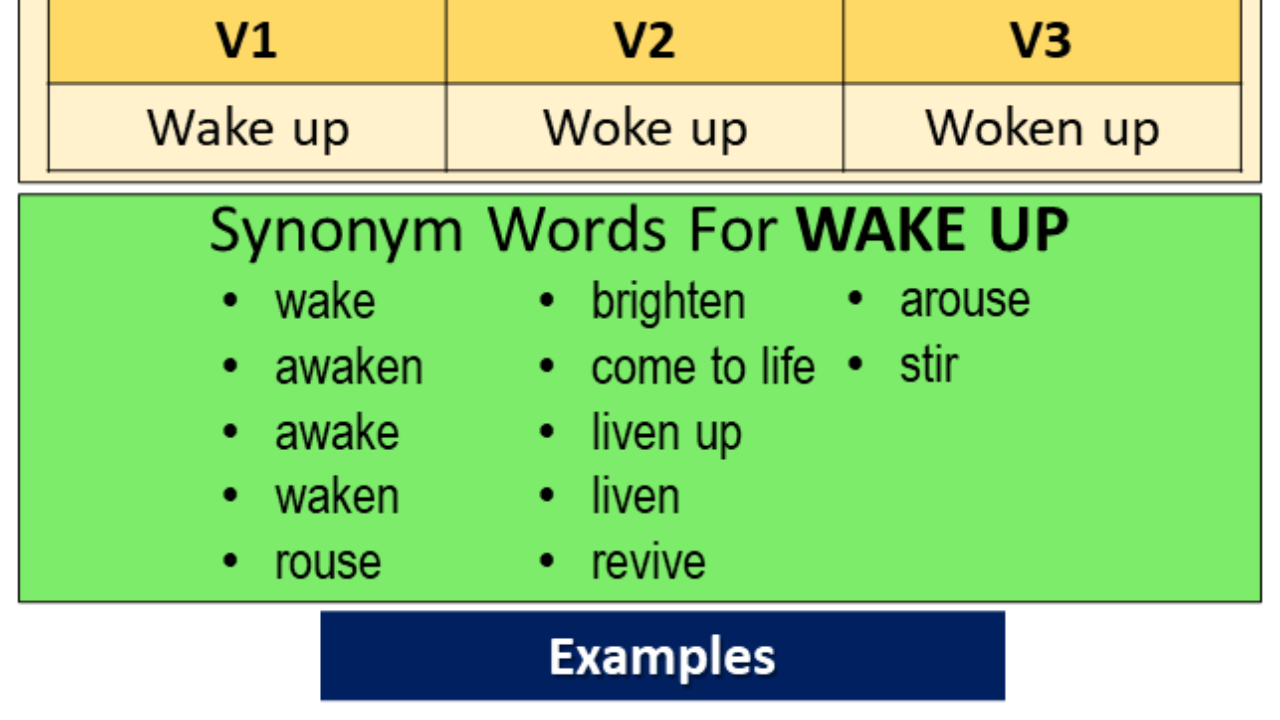
Wake Past Participle Leandroctx
Emerge or cause to emerge from a state of sleep; stop sleeping. (verb) Hold a vigil beside (someone who has died) (verb) A watch or vigil held beside the body of someone who has died, sometimes accompanied by ritual observances including eating and drinking. (noun) Synonyms awake, awaken, waken, waken up, rouse, stir, come to, come around,
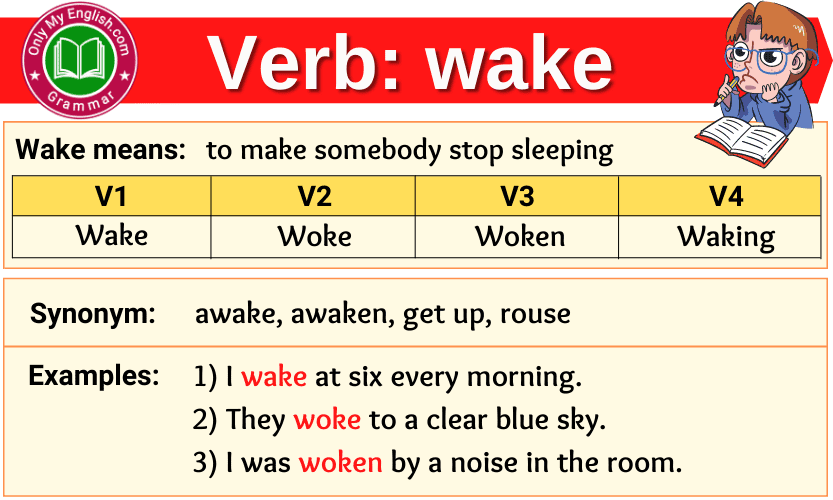
Wake Verb Forms Past Tense, Past Participle & V1V2V3
Grammar Reference Irregular Verbs List Definition: To Wake Irregular verb: To Wake Verb conjugation: Wake - Woke - Woken Meaning of 'To Wake' To stop sleeping and become conscious To make somebody stop sleeping Conjugation of verb 'Wake' Irregular Verbs Following a Similar Pattern Verbs like: Subscribe to Ad-Free Browsing
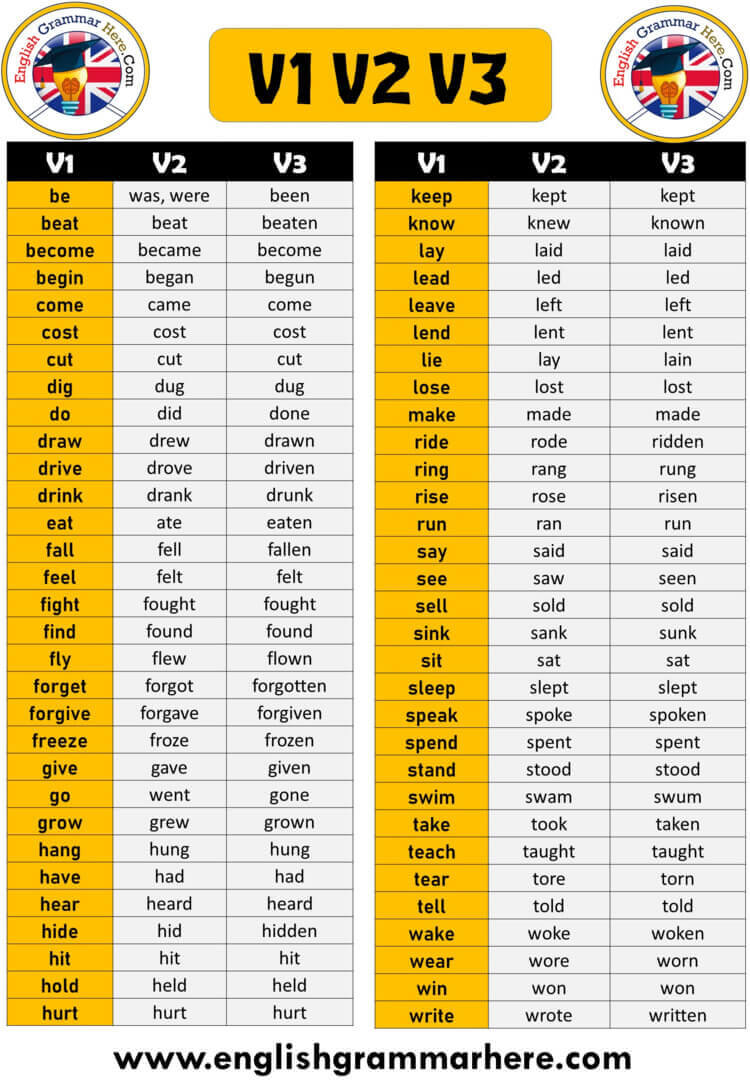
Verb 1 2 3, V1 V2 V3 Verb Form List in English English Grammar Here
Wake Verb Forms V1 V2 V3 . Base Form (V1) wake: Past Form (V2) waked/woke: Past Participle Form (V3) waked/woken: s / es/ es (V4) wakes 'ing' form (V5) waking . Hope you must have liked this post-Wake Verb Forms In English, you also share it.
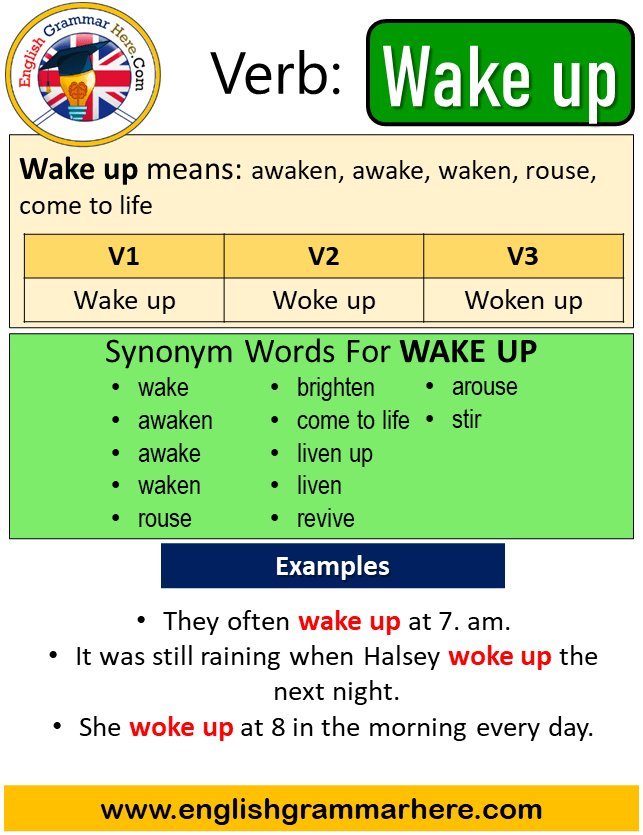
Wake up Past Simple, Simple Past Tense of Wake up, Past Participle, V1 V2 V3 Form Of Wake up
The English verb "to wake" is an irregular verb that is used to express the action of transferring something to someone or something else. It undergoes changes in its base form, past tense, and past participle. The conjugation verb forms v1 v2 v3 v4 v5 "to wake" in different tenses is as follows: V1 V2 V3 V4 V5 FORM OF WAKE

Wake past simple simple past tense of wake past participle v1 v2 v3 form of wake english grammar
WakeV1 V2 V3 V4 V5 has five different forms: base form V1, past tense V2, past participle V3, present perfect V4, and present perfect participle V5 form. Skip to content Menu HOME GRAMMAR Present Simple Present Continuous Present Perfect Present Perfect Continuous Past Simple Past Continuous Past Perfect Past Perfect Continuous Future Simple

Wake past simple simple past tense of wake past participle v1 v2 v3 form of wake english grammar
watch rites obsequies Example Sentences with Wake, Woke, Woken V1 V2 V3 Advertisements They often wake up at 7. am. I wake up seven o'clock by means of an alarm clock. Baby wakes up if we make too much noise. My father woke up early in the morning to realize his biggest dream, now we have a huge aquarium with colorful fish in our house.
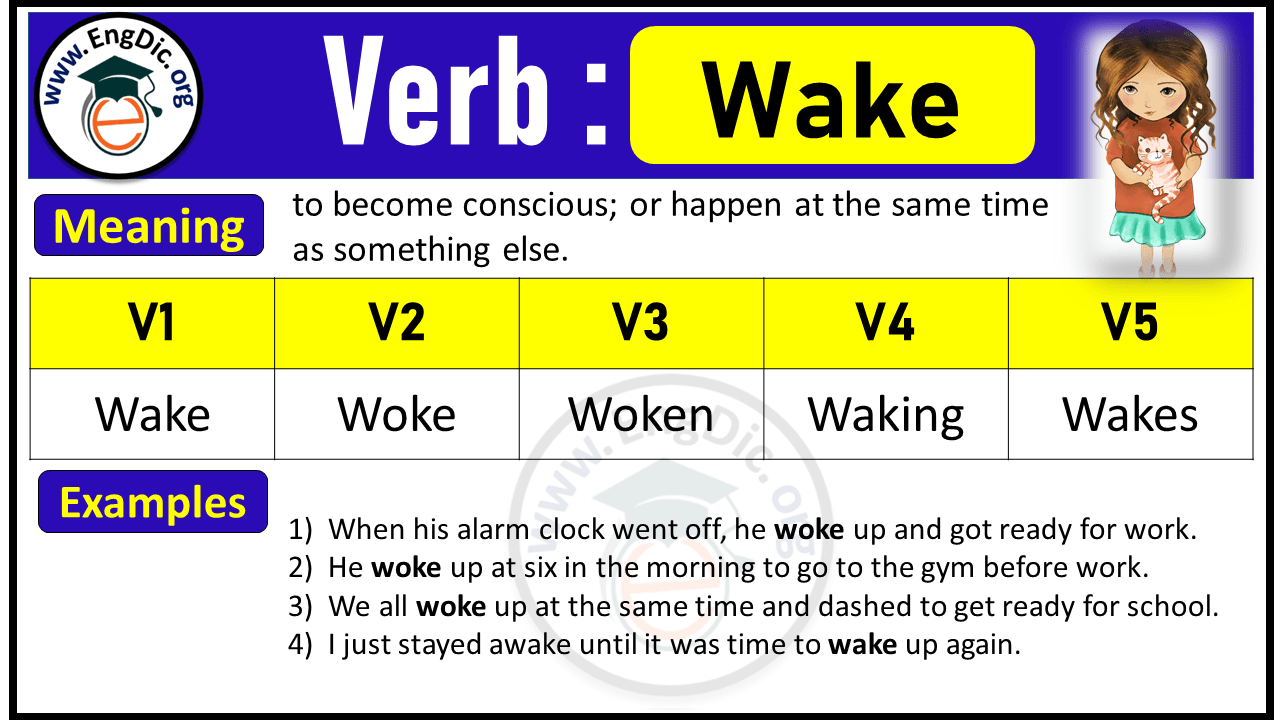
Wake past participle Archives EngDic
Wake Past Simple, Past Participle, V1 V2 V3 Form of Wake Verb; Wake Meaning; wake, wake up, awaken V1, V2, V3, V4, V5 Form of Wake Base Form Past Form Past Participle wake woke woken Base Form s/es/ies ing Form wake wakes waking Here are 1000 V1 V2 v3 List in English; V1 V2 V3 abash abashed abashed abate abated abated abide abode abode absorb absorbed absorbed accept accepted accepted.
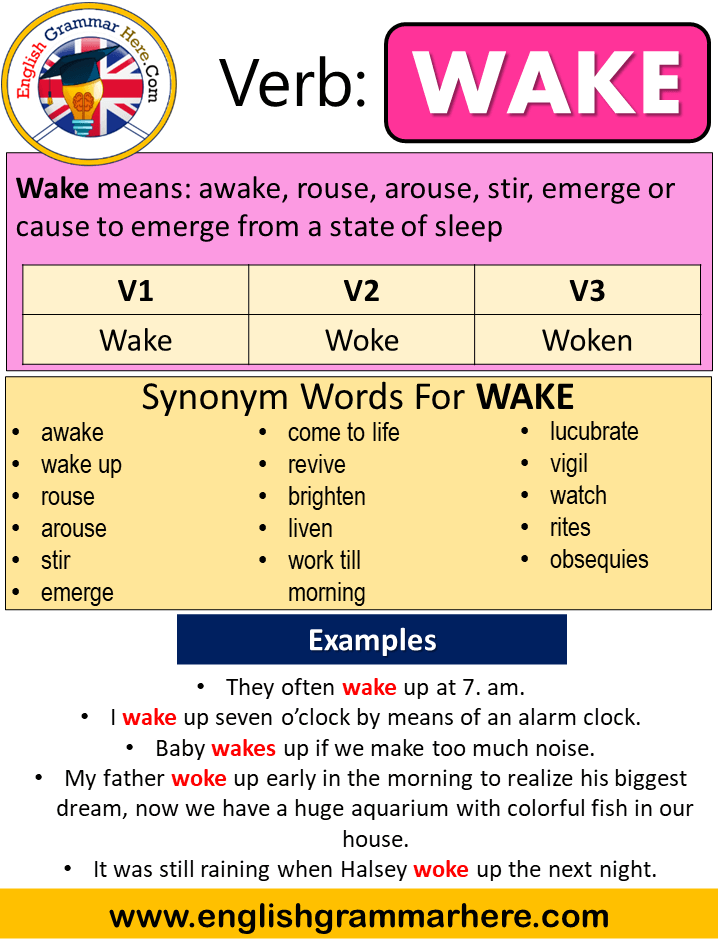
Wake Past Simple, Simple Past Tense of Wake, Past Participle, V1 V2 V3 Form Of Wake English
A watch or vigil held beside the body of someone who has died, sometimes accompanied by ritual observances including eating and drinking. (noun) Synonyms awake, awaken, waken, waken up, rouse, stir, come to, come around, Example Sentences with wake She admired him; she was used to clutching her hands together in his wake and heaving audible sighs.
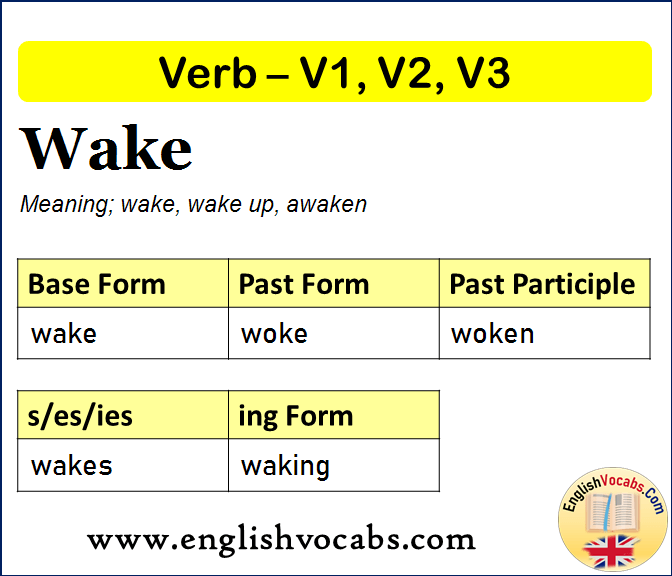
Wake Past Simple, Past Participle, V1 V2 V3 Form of Wake English Vocabs
Meaning: to become conscious; or happen at the same time as something else. Table of Contents Wake Verb Forms V1 V2 V3 V4 V5 Wake Past Tense: Past Tense of Wake is Woke. Example: Sarah woke the guard. Wake Past Participle: Past Participle Form of Wake is Woken. Example: Sarah has woken the guard. Wake Present Participle:
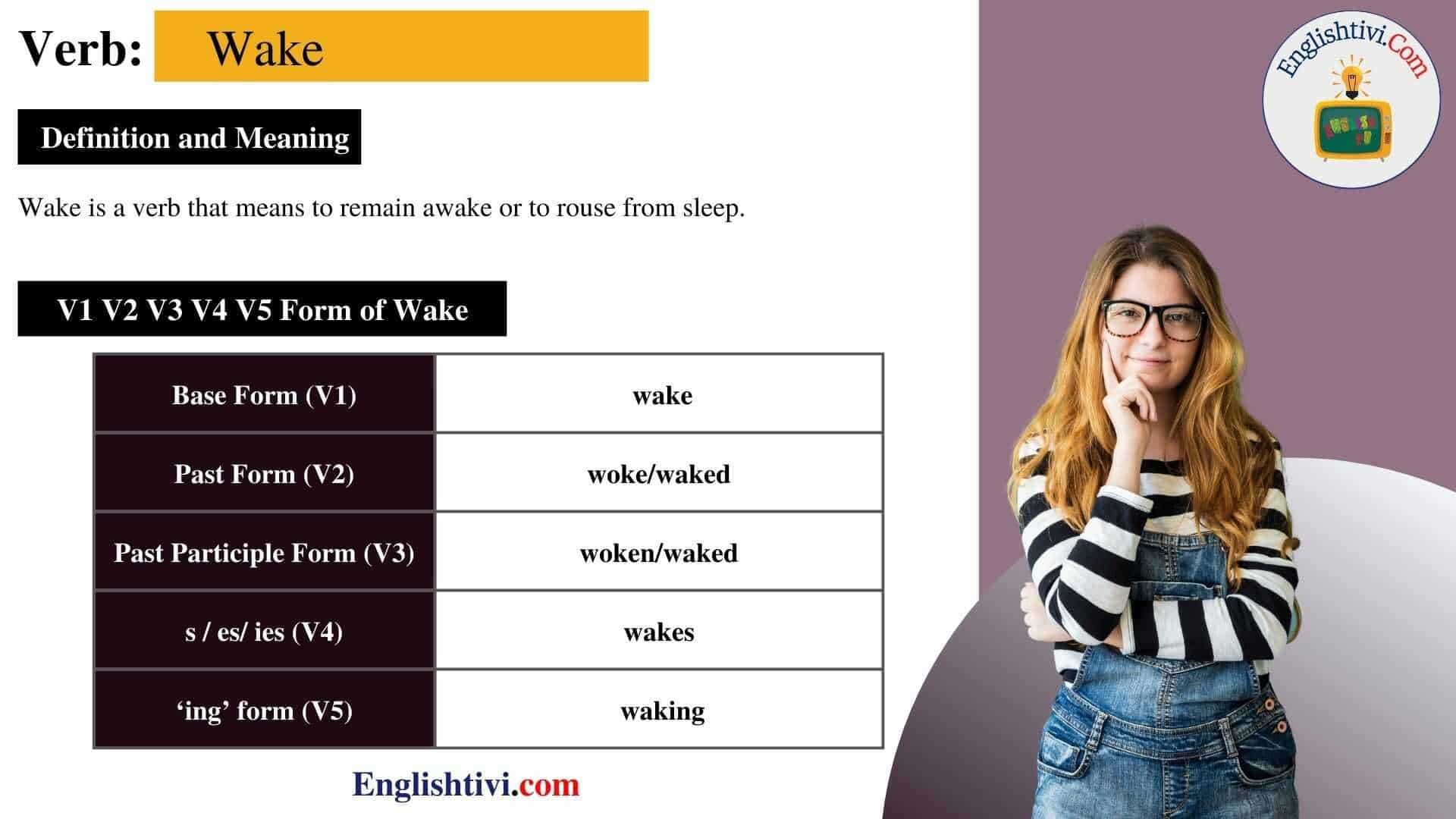
Wake V1 V2 V3 V4 V5 Base Form, Past Simple, Past Participle Form of Wake Englishtivi
Wake V1 V2 V3 V4 V5 is one of the verbs that are used very commonly in English tests as well as in everyday communication. Also, because it's an irregular verb, wake doesn't follow the regular rule. The verb " wake " has five different forms: base form, past simple, past participle form, present perfect, and present perfect participle.
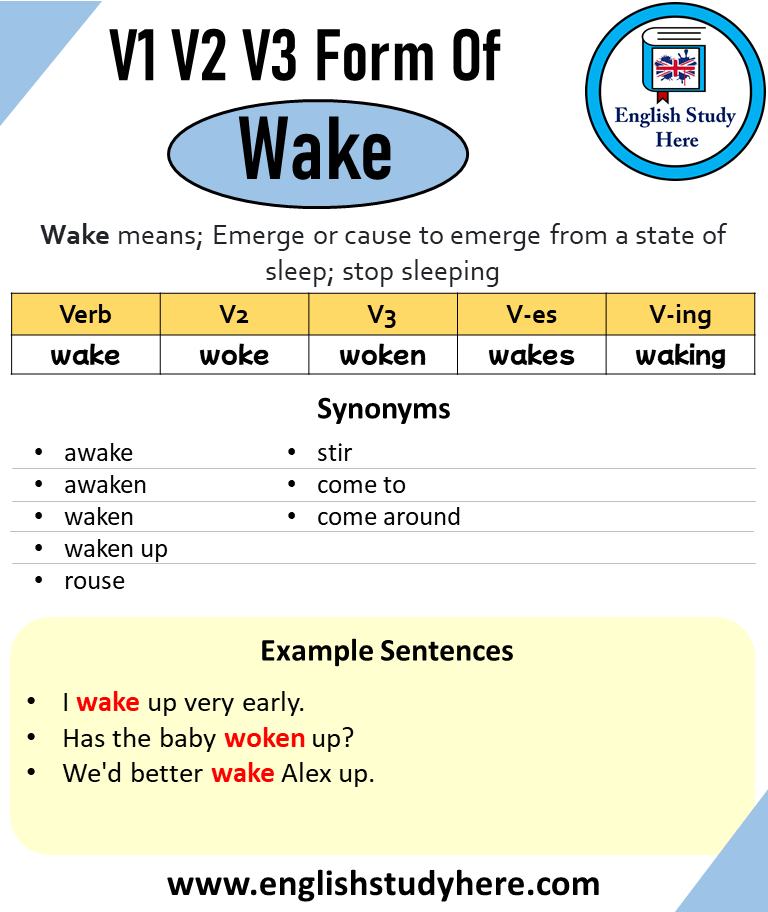
Past Tense of Wake, Past Participle of Wake, V1 V2 V3 V4 V5 Form of Wake English Study Here
awake awaken waken waken up rouse stir come to come around Example Sentences with Wake I wake up very early. Has the baby woken up? We'd better wake Alex up. Here are more verbs and v1 v2 v3 forms; About The Author admin

Wake V3 YouTube
admin August 6, 2021 Verb No Comments. Wake Past and Past Participle Form, v1 v2 v3 v4 v5 form of Wake. Meaning of Wake. Emerge or cause to emerge from a state of sleep; stop sleeping. (verb) Example Sentences with Wake. She woke up feeling better. He was attending a friend's wake. Verb. Wake.

Awake Past Simple, Simple Past Tense of Awake Past Participle, V1 V2 V3 Form Of Awake When
Verb; Awake Meaning; wake, awake, wake up, waken, arouse, stir V1, V2, V3, V4, V5 Form of Awake Synonym for Awake; Opposite of Awake Advertisements immobile blear-eyed inert foggy still lethargic quiet calm drowsy dormant numb stationary motionless sleepy stagnant lazy static dozy

Tổng hợp hơn 96 v3 do mới nhất Tin học Đông Hòa
Learn the three forms of the English verb 'wake'. the first form (V1) is 'wake' used in present simple and future simple tenses. the second form (V2) is 'woke', 'waked' used in past simple tense. the third form (V3) is 'woken', 'waked' used in present perfect and past perfect tenses.

List of Irregular Verbs, +150 Irregular Vers, V1 V2 V3 English Grammar Here Irregular verbs
wake, wake up, awaken, stir, come to, come round, bestir oneself, show signs of life, return to the land of the living, wakeful, sleepless, wide awake, conscious,. Past and Past Participle Form Tense of Yawn V1 V2 V3; Categories. Abbreviations (1) Active & Passive Voice (1) Adjectives (9) Adverbs (4) Antonyms (2) Collective Nouns (3.

Wake V1 V2 V3 V4 V5 , Past Tense, Past Participle Form of Wake EnglishAwesome
https://englishtivi.com/wake-v1-v2-v3-v4-v5-base-form-past-simple-past-participle-form-of-wake/Wake V1 V2 V3 V4 V5 Base Form, Past Simple, Past Participle Fo.